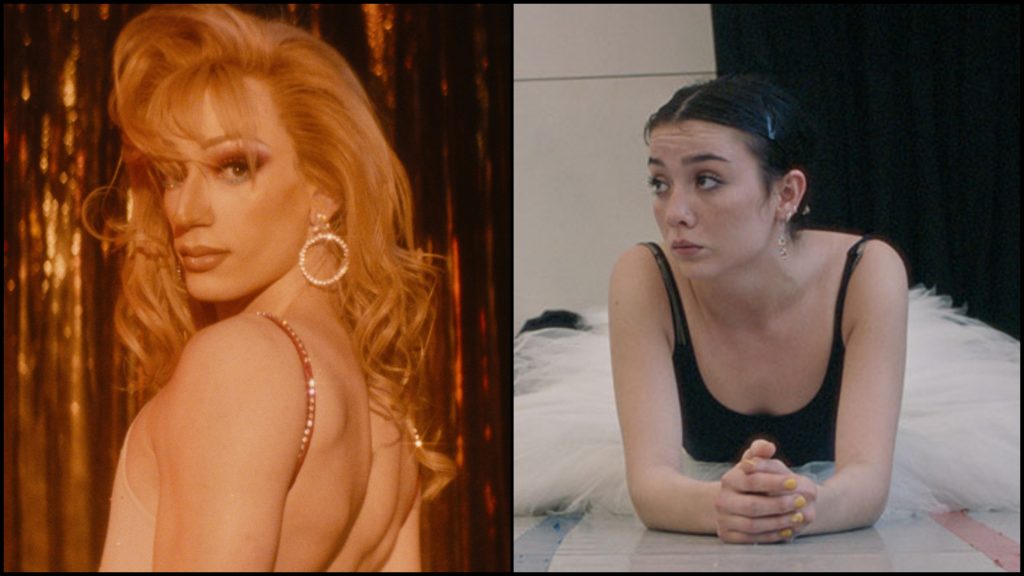Reviews include Superman, Apocalypse in the Tropics, and To a Land Unknown.
TFCA Friday: Week of Sept. 29
September 29, 2023

Welcome to TFCA Friday, a weekly round-up of film reviews and articles by TFCA members.
In Release this Week
Carlos (dir. Rudy Valdez)
“It’s clear that Carlos is the kind of film that couldn’t be made without the support of the musician and his backers, who include such producers as Ron Howard, Brian Grazer, and Sam Pollard. And why not?” asks Marc Glassman at POV Magazine. “Carlos Santana is the first Latin Rock-era star, who worked colour-free with Black, Latin, and white players. He’s an extraordinary musician who deserves full credit for holding onto his roots—Santana is Mexican-American—while embracing North America’s popular culture.”
The Creator (dir. Gareth Edwards)
“The Creator is oddly a bonding-and-relationship-reconnection movie, despite the constant carnage and chase scenes. Joshua’s experience with the AIs is ultimately one of acceptance. The we-are-them note was carried all the way down to casting, where many of the actors were reportedly not told whether they were playing humans or robots,” says Jim Slotek at Original Cin. “The scenario-flip changes the way we view the movie. Maybe partly because of his Star Wars connection, Nomad becomes less a dreadnaught defending mankind and more like the Death Star. And Alphie’s much-feared powers remarkably resemble The Force.”
“Joshua and his team of elite operatives journey across enemy lines, into the dark heart of AI-occupied territory only to discover the world-ending weapon he’s been instructed to destroy is an AI in the form of a young child,” notes Gilbert Seah at Afro Toronto. “Apparently, according to the voiceover, L.A. had been destroyed by A.I., and A.I. is currently banned in the United States. But not in New Asia. What is new Asia? The New Asia shown are Vietnamese-looking Asians in straw hats working in the padi (rice) fields. The film attempts to be the reverse of what the Americans did in the Vietnam War.”
“There are a solid half-dozen moments during the new sci-fi thriller The Creator in which your head might explode,” writes Barry Hertz at The Globe and Mail. “But the film’s biggest mind-blower might arrive long after Edwards’s film ends. That is when, after inspired by the production to do some light research, you might discover that the spectacle – beautiful and grand and epic – somehow cost about US$20-million less than no bigger a piece of cinematic tripe than Expend4bles. And at least $100-million less than the sloppy CGI spectacle of the latest Marvel offering.”
Fair Play (dir. Chloe Domont)
“A big part of the film’s success is the excellent work of its cast. Both Dynevor and Ehrenreich are terrific, able to convey the subtle and sometimes not-so-subtle shifts in what they’re experiencing together as a couple and as individuals,” writes Karen Gordon at Original Cin. “Both characters are dealing with internal earthquakes that are challenging their own identities, in small ways that start to add up, destabilizing who they thought they were, and what their values are. That they feel like full-blooded human beings navigating both the office politics and their own strengths and weaknesses makes this resonate.”
“Dynevor, familiar to most for her work on Bridgerton, holds her own as a 21st-century student of Gordon Gekko, even as Emily pushes herself into some particularly ugly corners of the market,” says Barry Hertz at The Globe and Mail. “And Ehrenreich, fresh off some seriously impressive scene-stealing work in Oppenheimer, makes Luke’s slip into sliminess seem more gradual than mere flip-switch. Watching the two performers go from tearing off each other’s clothes off to tearing into each other’s weaknesses is both a pleasure and a terror. But Fair Play is not a film to fall in love with – it wants you to feel dirty. And for all the wrong reasons.”
“The film unfortunately takes too much than it can chew. The film goes downhill after the engagement party. It is a pity as the film worked quite well up to this stage, making the film entertaining to this point,” observes Gilbert Seah at Afro Toronto.
“A stronger term than ‘sharks’ is needed for the corporate and courtship savagery in Chloe Domont’s arresting feature debut,” notes Peter Howell at the Toronto Star. “Phoebe Dynevor and Alden Ehrenreich are brilliant as lovers and co-workers willing to slash Cupid’s throat for career advancement. It all starts sweetly enough: Dynevor’s Emily and Ehrenreich’s Luke, aflame with ardour and lust, decide to get secretly engaged, despite the no-office-romances rule of the cutthroat New York trust fund they both work at.”
Flora and Son (dir. John Carney)
“Nothing in Flora and Son – from the fraught domestic dynamics to the gently ear-wormy music, written by Carney and Scottish musician Gary Clark – represents a departure for its director,” notes Barry Hertz at The Globe and Mail. “But Carney knows exactly what he’s doing here, and has the experience and confidence to pull off his familiar tricks remarkably well. If you fell in easy love with the two songbirds at the heart of 2007′s Once, then it will take only the slightest of nudges to become enamoured by the raised-eyebrow chemistry between Hewson and Gordon-Levitt (whose character eventually breaks out of Flora’s computer screen to imaginatively appear ‘live’ in her apartment).”
“Director Carney invests an entire segment on the song ‘Both Sides Now’ by Joni Mitchell. Flora is told that there is a song she has to listen to and she listens to ‘Both Sides Now’ as performed by Mitchell on the television,” writes Gilbert Seah at Afro Toronto. “The melody and lyrics, reflecting how life can be looked upon are simply beautiful. Director Carney demonstrates both the seeming effortlessness of coming up with a hit song as well as the care and work that is actually put in (a metaphor for filmmaking?) to create it.”
“If Flora and Son is your first John Carney movie, you’re in for a treat. And if you’re a fan of his other films, know that like a fine wine, the writer-director keeps improving with age. Carney is in top form here with a delightful and entertaining musical dramedy made to soothe your soul,” writes Victor Stiff at That Shelf. “However, Carney doesn’t go the obvious route here. The characters wants and desires don’t align with the viewers’ expectations, and that makes for a much more compelling film.”
Mr. Dressup: The Magic of Make-Believe (dir. Rob McCallum 🇨🇦)
“Stoics be warned. If you fought to not emotionally ‘break’ during the Mr. Rogers doc Won’t You Be My Neighbor, you may be even more inclined to snap, ‘I’m not crying, you’re crying!’ during Mr. Dressup: The Magic of Make-Believe,” advises Jim Slotek at Original Cin. “Whatever mysterious cultural alchemy turned what was effectively an arts and crafts show for kids into a generational influence, the influence is there in the guest commentary. Barenaked Ladies, Kids in the Hall, Michael J. Fox, singer-songwriter Bif Naked, Fred Penner, Eric McCormack and more, all lend their memories and gratitude for the influence of the man who encouraged, ‘an open mind and an open heart.’”
“But beyond taking a merely retrospective, historical view, The Magic of Make-Believe preserves Mr. Dressup’s legacy and demonstrates its relevance to kids—and adults—today,” notes Rachel Ho at POV Magazine. “There’s no doubt that the world has changed drastically since 1996, and exponentially since 1967 when the show first aired. Our media tastes reflect that. However, there’s an argument to be made that, for children, the simple production of shows like Mr. Dressup and its American equivalent, Mister Rogers’ Neighborhood, is forever in style.”
“While making for a decidedly audience-friendly mega-dose of nostalgia, it doesn’t really come together as a cinematic documentary,” admits Jason Gorber at POV Magazine. “There aren’t too many skeletons hidden in that famous Tickle Trunk, of course, but after a while it really does feel like the kind of thing that would play at a memorial service, or maybe some Heritage Minute celebration on the national broadcaster, rather than a fully formed film.”
Nightmare (dir. Kjersti Helen Rasmussen)
“[T]he film has lots of opportunity going for it as a really scary horror flick owing to its creepy and little-known subject,” says Gilbert Seah at Afro Toronto. “One variation the film goes into is the concept of controlling one’s nightmares. It is assumed that if one is awake, then one can get out of one nightmare and control it to some degree, Mona is given this option by her doctor who allows her to flick on a light switch to wake herself up, if she is capable of doing that in her dream. Mona does, but the light is faulty and does not turn on – though Mona is saved in the nick of time.”
On Fire (dir. Nick Lyon and Peter Facinelli)
“When the fire arrives, it’s fast, furious and apparently capable of an emotional response to being goaded. How else to explain the scene in which a frustrated Clay screams ‘Fuck you, fire!’ and damned if the inferno doesn’t redouble its efforts to come after him,” groans Chris Knight at Original Cin. “There’s also an unintentionally goofy shot of the family dodging a licking tongue of flame, in slow motion no less. It’s not quite on par with outrunning an explosion, but it’s close. Oh, and while we’re talking risible moments, how about Mom moaning: “This is the worst night of my life!” You don’t say.”
Paw Patrol: The Mighty Movie (dir. Cal Brunker 🇨🇦)
“You have to take matters into your own hands or paws, if you are the small ‘Skye’ is the smallest and littlest of the Paw Patrol,” writes Gilbert Seah of Afro Toronto. “There are quite a bit of story that goes along with this notion. Skye is the first one to get the superpowers and feels that for the first time, it can excel and want a better life. The message comes with an encouraging tune. It is difficult not to like a film that offers endearing moments like these.”
“While not approaching the emotional complexity or layered themes of a Pixar title – nor the go-for-broke slapstick of a Minions flick – The Mighty Movie goes big on the eye candy and pint-sized thrills that kids desire,” says Barry Hertz at The Globe and Mail, who also chats with the team behind the a made-in-Canada success story: “We learned so much from the first movie, which had a short schedule and a very conservative budget,” says ,” says producer Jennifer Dodge. “So on the second, we knew we could take those original assets and update the things we wanted to deliver something bigger.”
The Re-Education of Molly Singer (dir. Andy Palmer)
“The Re-Education of Molly Singer is the third movie this year with an irresponsible adult hired to babysit a young teen,” sighs Gilbert Seah at Afro Toronto. “Originality aside, the film is entertaining and generates barely sufficient laughs.”
Saw X (dir. Kevin Greutert)
“Saw X delivers what is expected from the Saw franchise, so if one is not prepared for torture and more torture, blood, gore, and violence, then best to avoid the film,” says Gilbert Seah at Afro Toronto. “Victims of scammers might especially delight in the torture. Who would not like to see someone who has stolen money from innocent and often helpless victims suffer the consequences? But given the film’s ‘content’, director Greutert succeeds well in a real horror torture flick that definitely makes its mark.”
Solo (dir. Sophie Dupuis 🇨🇦)
“In fact, Solo is sincerely old-fashioned, a film that focuses not on hot button issues but on tender, age-old affairs of the heart. The third collaboration between Quebec director-writer Sophie Dupuis and actor Théodore Pellerin (Family First, Underground) harks back to vintage big-screen backstage melodramas such as A Star Is Born and All About Eve, scaled down to the interiors of small Montreal bars and apartments,” notes Liam Lacey at Original Cin. “Essentially a lip-synched musical, Solo weaves between flashy onstage performances full of attitude and artifice, with domestic scenes of intimacy and conflict.”
“Canadian cinema has a surprising number of director-actor BFFs: Atom Egoyan and Bruce Greenwood (five films), David Cronenberg and Viggo Mortensen (four), Xavier Dolan and Suzanne Clément (three). To that impressive roster audiences should now add Sophie Dupuis and Théodore Pellerin, who collaborate for their third time on the intimate and tender new drama, Solo,” proclaims Barry Hertz at The Globe and Mail. Hertz also speaks with Dupuis about the film being a turning point in her life: “I think that I needed to shoot this film to confirm my queerness. It was mostly a feeling of finding my people and feeling at home for the first time. Sometimes directors are stressed out while preparing films and they’re not sleeping. But I wasn’t sleeping because I was having all these queer epiphanies! Now I understand life! I created a safe space for myself without even knowing it. And now I cannot go back. There’s only before Solo and after Solo for me,” says Dupuis.
“Director Dupuis shows Simon is a good-hearted person with reasonable needs, but it’s just as obvious he’s caught in a pattern of codependence, desperately seeking approval from two strong personalities equally incapable of granting it,” writes Gilbert Seah at Afro Toronto. “In the end, the one person Simon truly needs to commune with is himself. The drag shows are bright and sassily performed complete with elaborate costumes. Director Dupuis captures the behind-the-scenes of the drag shows with credible effect. Solo is entertaining enough though the depiction of Simon’s relationship struggles appear manipulative to a fault.”
“Solo is a terrific showcase for Pellerin, Dupuis’s friend and cinematic muse, who also starred in her two previous features, playing a drug lord’s fractious relation in Chien de Garde (Family First) and an injured miner in Souterrain (Underground). A versatile and intuitive actor, Pellerin is also making his presence known outside of Canada, in such films as Beau Is Afraid and Never Rarely Sometimes Always,” writes Peter Howell at the Toronto Star. “Pellerin’s 20-something Simon is another fully invested character for him.”
“While Solo situates Simon’s growth within a clearly defined chosen family, the film ultimately hinges on Pellerin’s performance. It’s a lively star-is-born turn in which one sees an actor fully come into his own,” writes Pat Mullen at Xtra. Mullen also speaks with director Sophie Dupuis and star Théodore Pellerin about their love letter to the drag scene. “There’s an aspect of this character [Simon] that I haven’t reached in myself yet, and I had to learn to be able to give myself to this character. I think that Solo was allowing a femininity to come out or an easiness with femininity that I don’t think was ever a problem before, but more so than I thought,” Pellerin tells Mullen.
Stop Making Sense (dir. Jonathan Demme, 1984)
“Thanks to a brand new restoration, the 4K presentation of which premiered at Toronto International Film Festival on the giant IMAX screen, the film remains nothing short of awe-inspiring,” raves Jason Gorber at POV Magazine. “Previous home video releases have been sufficient to introduce its power to audiences who weren’t lucky enough to see the film during its theatrical run, but this, my friends, is a whole other beast. The assets were clearly in good shape, and everything from the banal monotone of the grey suits through to the electric reds that backlight the band later in the production, come across and almost psychedelic in their intensity.”
At the Toronto Star, Howell speaks with the stars behind the festival’s hottest ticket: a reunion screening of Stop Making Sense with the Talking Heads. The band members tell Howell about what it means to be back together after so many years. “Any kind of separation/divorce thing is bound to be fairly traumatic, but it comes to a point where, at least for me, there’s a realization that, yeah, the way I handled things was not perfect,” David Byrne tells Howell. “I probably could have done things a lot better than what I did at the time, but we’re trying to make amends. And here we are and look at the incredible thing that we did.”
Swan Song (dir. Chelsea McMullan 🇨🇦)
“[A] thrilling look at the tension, the pain and the politics involved in creating the adventurous production of Swan Lake that Karen Kain directed last year for National Ballet of Canada — a milestone that marked both the 72-year-old Canadian ballet legend’s directing debut and her retirement after a 50-year career with the company as a dancer and artistic director,” writes Brian D. Johnson at Zoomer. Johnson also speaks with Kain and director Chelsea McMullan, and the film team about the ambitious backstage production: “It was an infinity mirror,” McMullan tells Johnson, “This is what I was itching to do, real verité — having things unfold — and it was the hardest thing I’ve ever done in my life.”
“Director McMullan, who co-directed last year’s Ever Deadly with Tanya Tagaq on throat singing, has an eye for vulnerable moments, as when Genevieve Penn Nabity, a junior member of the company, is offered an opportunity she’d never expected,” says Gilbert Seah at Afro Toronto. One complaint is that director McMullan takes her doc to an overdone happy Hollywood ending. Kain is praised so many times that it becomes annoying. Kain, before the opening night was worried as a lot went wrong during the final dress rehearsal but on opening night, Kain kept saying that everything went on perfectly on opening night, going on to praise everyone over and over again.”
“In lieu of an anguished or bittersweet goodbye from Kain, Swan Song portrays an industry and profession in the throes of change with the hopes of welcoming dancers from all walks of life. Kain’s accomplishments as a dancer notwithstanding, the film successfully contends that her true legacy lies in the contributions she’s made to ensure that the ballet world she leaves behind is better than the one she entered,” says Rachel Ho at POV Magazine. “For one last time, Ms. Kain: Mérde!”
“The documentary, which will also play as a four-part series this fall, follows Kain as she remains cool while dealing with COVID-19 delays, a diva ballerina, elaborate trip hazards from the costume department, and exhausted dancers who run five kilometres during the fourth act alone. Kain’s reputation is on the line here after a lifetime devoted to ballet, which makes Swan Song an artfully anxiety-inducing backstage drama,” writes Pat Mullen at POV Magazine. “From Kain’s anxious perspective among the crowd to the dancers enjoying the show in the wings, Swan Song delivers an immersive portrait after the fashion of dance docs like Jody Lee Lipes’ Ballet 422 (2014) and Frederick Wiseman’s La danse (2009).”
Wes Anderson Shorts
At Afro Toronto, Gilbert Seah looks at new short films by Wes Anderson: The Rat Catcher (“This short amplifies the technique Anderson uses in his storytelling/filmmaking that makes him such a unique and wonderful filmmaker) and The Wonderful World of Henry Sugar (“The short story is written and directed as a short film by Anderson in what might be described as a wonderful film of Wes Anderson).
A Festival of Festival Coverage: #MeToo and “Elevated Horror”
At The Globe and Mail, Johanna Schneller looks at recent festival flicks like Fair Play, The Royal Hotel, and Woman of the Hour and considers how the women behind the camera tackle the agency of their protagonists. “Domont set Fair Play in the hyper-male world of high finance, ‘where #MeToo never hit; it went straight to becoming a joke to sneer at…The margin of error for women in those worlds is paper thin. If you don’t go to the strip bar you’re stuck up; if you do go you’re too wild.’” The Royal Hotel director Kitty Green, meanwhile, asks, “If they get away with x, what about y? When do we stop them? What behaviours are entry points to sexual abuse and assault, and how do we stop it before it gets there?”
At the TFCA blog, Marriska Fernandes chats with a trio of filmmakers—Hirokazu Kore-eda (Monster), Fawzia Mirza (The Queen of My Dreams), and Zarrar Kahn (In Flames)—about their works on the circuit. Here’s Kahn talking about finding power in putting conventions of horror to use while representing the Pakistani community in In Flames: “I think marginalized communities or creators who haven’t necessarily been able to access the tools to production have been attracted to horror because horror has always been outsiders,” Kahn tells Fernandes. “Horror has always been [made by] storytellers and has long been looked down upon as B-cinema, and only now, we’re having conversations about ‘elevated horror,’ but what is ‘elevated horror’? It was always elevated. The metaphor [of horror] allows people who wouldn’t have had the tools or the ability to speak about things that are so terrifying in their communities in a way that’s accessible to audiences.”



